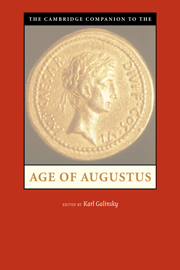Book contents
- Frontmatter
- Introduction
- Part I Political History
- Part II Intellectual and Social Developments
- 3 Mutatas Formas: The Augustan Transformation of Roman Knowledge
- 4 Romans in the Roman World
- 5 Provincial Perspectives
- 6 Women in the Time of Augustus
- Part III The Emperor's Impact
- Part IV Art and the City
- Part V Augustan Literature
- Part VI Epilogue as Prologue
- Select Bibliography and Works Cited
- Index
4 - Romans in the Roman World
from Part II - Intellectual and Social Developments
Published online by Cambridge University Press: 28 March 2007
- Frontmatter
- Introduction
- Part I Political History
- Part II Intellectual and Social Developments
- 3 Mutatas Formas: The Augustan Transformation of Roman Knowledge
- 4 Romans in the Roman World
- 5 Provincial Perspectives
- 6 Women in the Time of Augustus
- Part III The Emperor's Impact
- Part IV Art and the City
- Part V Augustan Literature
- Part VI Epilogue as Prologue
- Select Bibliography and Works Cited
- Index
Summary
Introduction
During the period of the Roman conquest of the Mediterranean basin, a singular form of deracinated but coherent society came into being. Starting as mercenaries, even pirates, and moving seamlessly into the world of commerce and ultimately the management of Roman provinces, a whole diaspora of mobile, opportunistic Italians outside Italy - men and women, slaves and free, very rich and grindingly poor - had come into being by the beginning of the first century B.C. Their identity was not much shaped by a sense of a common homeland, because Italy itself was so heterogeneous and - especially at this time - changing so fast. The changing fortunes of this loose collectivity have resisted generalization because of its erratic and labile distribution in space and time. Yet it can claim to be one of the great diasporas, to be compared with the archaic Phoenician and Hellenic diasporas, or that of the Hellenistic Jews. It was maintained through common interaction with the Roman state, especially through military service, and through a growing feeling of shared advantage over non-Romans. It was therefore indeed neither a simply colonial nor a truly ethnic phenomenon: but in it lie clues to the dynamic of Roman imperial power, and to the cultural weave of the empire itself, east and west, of the provinces and, in many respects, of Italy too. These - besides free-born Romans they included grantees of citizenship, and freedmen and their descendants - were the people who formed the Roman core of provinces and who bound client-kingdoms into the fabric of the imperium.
- Type
- Chapter
- Information
- The Cambridge Companion to the Age of Augustus , pp. 85 - 105Publisher: Cambridge University PressPrint publication year: 2005
- 26
- Cited by

